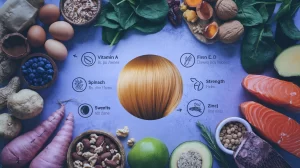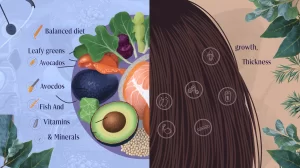Is your hair not growing as it used to or showing signs of thinning? You might be missing essential micronutrients! Vitamins and minerals are key players in maintaining healthy hair, promoting growth, and preventing breakage. This article delves into which micronutrients matter most and offers practical advice on incorporating them into your daily routine for stronger, healthier hair.

Why Micronutrients Are Essential for Hair Health
Micronutrients are the vitamins and minerals that our body requires in small quantities, yet they play a huge role in supporting hair growth, structure, and shine. Understanding which micronutrients affect your hair can empower you to take control of your hair health and prevent common issues like thinning and breakage.
What You’ll Learn from This Guide
- Identify the vitamins and minerals that promote hair health.
- Discover nutrient-rich foods that nourish hair from within.
- Learn about supplements that can help fill any dietary gaps.
The Role of Micronutrients in Hair Growth and Structure
Why Vitamins and Minerals Are Crucial
Vitamins and minerals are essential for more than just our general well-being—they’re critical for hair health too. These nutrients support everything from growth and strength to shine and resilience. Without adequate micronutrients, hair may become dull, weak, or prone to falling out.
Micronutrients and Hair Structure
Micronutrients help each strand of hair grow stronger, from the follicle to the tip. Deficiencies can impact the hair growth cycle, leading to conditions like thinning, shedding, and brittleness. Nutrient-rich hair care begins with a balanced diet that provides the vitamins and minerals necessary for optimal growth and health.
Key Vitamins Essential for Hair Health
Each vitamin supports specific aspects of hair growth and strength. Here’s a breakdown of the most crucial vitamins for hair health:
1. Vitamin A: Sebum Production
Vitamin A supports the production of sebum, the natural oil that keeps the scalp moisturized. A well-hydrated scalp is crucial for reducing dryness and breakage.
- Daily Recommended Intake: 700-900 mcg for adults.
- Caution: Excess vitamin A can lead to hair loss, so maintain balance.
2. Vitamin B Complex: Strengthening and Growth
The B-complex vitamins, especially biotin (B7), play a significant role in maintaining hair strength and promoting growth. Biotin supports keratin production, which strengthens hair follicles.
- Impact: Helps reduce breakage and promotes thicker hair.
- Tip: While biotin is essential, too much can interfere with lab tests, so use with care.
3. Vitamin C: Antioxidant and Collagen Support
Vitamin C not only serves as an antioxidant but also aids collagen production, a protein essential for strong hair. It also improves iron absorption, a critical factor for hair growth.
4. Vitamin D: Stimulating Hair Follicles
Vitamin D stimulates hair follicles, promoting the growth of new strands. Low levels have been linked to autoimmune conditions and hair thinning.
- Daily Recommended Intake: 600 IU for adults.
- Note: If you’re not getting enough from sunlight, consider a supplement.
5. Vitamin E: Improving Scalp Circulation
Vitamin E enhances blood circulation in the scalp, ensuring that hair follicles receive the nutrients they need to thrive. It also acts as an antioxidant to protect the scalp from environmental damage.
Essential Minerals for Healthy Hair
Minerals are just as vital as vitamins for maintaining strong and resilient hair.
1. Iron: Preventing Hair Loss
Iron is essential for delivering oxygen to hair follicles. Low iron levels can lead to hair loss and breakage. Foods rich in iron, such as spinach, red meat, and beans, can help maintain healthy levels of this mineral.
2. Zinc: Supporting Growth and Repair
Zinc aids in tissue repair and keeps the oil glands around hair follicles functioning well. Zinc deficiencies can cause hair thinning and even hair loss.
3. Selenium: Environmental Protection
Selenium, a trace mineral, protects hair and scalp from environmental damage through its antioxidant properties. However, too much selenium can lead to brittle hair and hair loss, so balance is key.
4. Magnesium: Supporting Protein Synthesis
Magnesium helps with protein synthesis, a necessary process for building strong hair. Without enough magnesium, hair can weaken and become prone to breakage.

The Impact of Diet on Hair Health
Balanced vs. Restrictive Diets
A balanced diet is vital for hair health, as it provides the necessary vitamins and minerals to support growth and resilience. Restrictive diets can lead to deficiencies, ultimately affecting hair quality. Diets high in processed foods or sugars can also compromise hair health, making nutrient-dense foods crucial.
Nutrient-Rich Foods for Hair Health
Incorporate these foods into your diet for hair that’s as strong as it is shiny:
- Eggs: High in protein and biotin, crucial for hair follicle health.
- Fatty Fish: Rich in omega-3 fatty acids, which nourish the scalp.
- Sweet Potatoes: Contain beta-carotene, which converts to vitamin A for sebum production.
- Spinach: Loaded with iron, vitamin A, and vitamin C to support scalp health.
- Avocados: Provide healthy fats and vitamin E, which improves scalp circulation.
- Nuts and Seeds: Excellent sources of zinc, omega-3s, and antioxidants.
- Greek Yogurt: Packed with protein and vitamin B5, promoting blood flow to the scalp.
Addressing Micronutrient Deficiency
Recognizing Signs of Deficiency
Common signs of micronutrient deficiency include hair loss, dry scalp, brittle hair, and thinning. If you notice these symptoms, it may be time to review your diet or consider testing your nutrient levels.
Testing for Nutrient Deficiency
A blood test is the most common method to check for micronutrient deficiencies. This test can identify any gaps in vitamins and minerals, allowing you to address deficiencies through targeted diet changes or supplementation.
Supplements for Hair Growth
When dietary sources aren’t enough, supplements can help ensure you’re getting the essential nutrients for hair health.
Choosing the Right Supplements
Look for supplements that include a blend of vitamins A, B (especially biotin), C, D, and E, along with essential minerals like iron and zinc. Omega-3 fatty acids are also beneficial. Remember to check with a healthcare provider before starting any supplement regimen.
New Research in Hair Health
Recent studies reveal the importance of balanced vitamin and mineral intake in preventing hair loss. Excessive levels of certain nutrients, like vitamin A or selenium, have been linked to hair loss, highlighting the need for balanced intake. Ongoing research is exploring the links between micronutrients, hair density, and patterns of hair loss, offering promising insights for future treatments.
Preventing Premature Graying
Micronutrients like vitamin B12, copper, and iron play a role in preventing premature graying. Ensuring adequate levels of these nutrients can help maintain your natural hair color for longer.
Practical Tips for Boosting Hair Health Through Nutrition
To enhance hair health, aim to eat a balanced mix of fruits, vegetables, proteins, and whole grains. Here are a few daily recommendations:
- Vitamin A: 700-900 mcg
- Biotin (Vitamin B7): Aids in growth and strength.
- Iron: Helps prevent thinning and supports blood flow to the scalp.
Incorporating these recommendations into your diet supports both hair health and overall well-being.
FAQs About Micronutrients and Hair Health
1. What are the best vitamins for hair growth?
Biotin, vitamin D, and vitamin E are essential for hair growth and support follicle health.
2. Can deficiencies in vitamins or minerals cause hair loss?
Yes, deficiencies in key nutrients like iron, vitamin D, or biotin can lead to hair thinning or loss.
3. How long before I see results from improving my diet?
Most people see improvements in hair health within 3 to 6 months, though significant growth can take up to a year.
4. Can too many supplements cause hair loss?
Yes, over-supplementing, especially with selenium or vitamin A, can lead to toxicity and potential hair loss.
5. Are there specific minerals for hair density?
Iron, zinc, and magnesium are essential for maintaining hair density and strength.
Conclusion
Micronutrients are the building blocks of healthy hair. By incorporating the right balance of vitamins and minerals into your diet, you can support hair growth, prevent hair loss, and achieve stronger, shinier locks. When diet alone isn’t enough, consider targeted supplements—but remember to consult with a healthcare provider to ensure safe and effective use.
Key Takeaways:
- Vitamins A, B, C, D, and E play unique roles in promoting hair health.
- Minerals like iron, zinc, and magnesium are essential for preventing hair loss and strengthening follicles.
- A nutrient-rich diet is vital; supplements can help fill any gaps in your nutrition.
Healthy, vibrant hair starts from within—nourish it with the power of essential micronutrients!
References
- https://www.health.harvard.edu/diseases-and-conditions/vitamins-minerals-and-hair-loss-is-there-a-connection (2024-04-22)
- https://www.ncbi.nlm.nih.gov/pmc/articles/PMC6380979/
- https://fullyvital.com/blogs/hair-care/vitamin-a?srsltid=AfmBOopQp9lgGqUK-9ewDqHT_QS6-pwRvF78W5LiEsaotXO6XoErZGaw (2023-09-19)
- https://www.hims.com/blog/is-your-vitamin-b-complex-helping-your-hair
- https://www.ncbi.nlm.nih.gov/pmc/articles/PMC6204628/
- https://www.medicalnewstoday.com/articles/321673
- https://www.healthline.com/health/beauty-skin-care/vitamin-e-for-hair (2017-12-14)
- https://www.trichology.com/unlocking-the-power-of-derma-iron-supplements-for-hair-health-and-growth/ (2024-03-23)
- https://fullyvital.com/blogs/hair-vitamins/zinc?srsltid=AfmBOopJQiePUpI80Ph-nCms9IkqigJY_Ils5_P1GhLIH7rNTCaV0SSX
- https://goldielocks.com/blogs/news/zinc-for-hair-growth?srsltid=AfmBOootZUNEJeqxUQahP69EFyJJ4PJUQo4ZirctX5ht_F8WfdbhxKfG
- https://fullyvital.com/blogs/hair-vitamins/selenium?srsltid=AfmBOoojUQynyH4_mLa3sF2z-DRHKb_CC_76-7sC3En63k7g5dSYLAwy (2024-02-16)
- https://epsolutionsalt.com/blogs/the-bathtub-club/magnesium-and-hair-growth-nourishing-your-locks-from-within
- https://vigorroots.com/blogs/vigor-roots-hair-care-tips/does-diet-affect-hair-growth?srsltid=AfmBOookhoyTqXyQvBQ1JolWFmVNA6QeM7GPLO6ATn3OjNwtVD8xgDPS (2022-08-17)
- https://www.healthline.com/nutrition/foods-for-hair-growth
- https://www.lahairmd.com/dietary-suplements-and-hair-loss/
- https://www.rupahealth.com/post/nutrient-deficiencies-responsible-for-hair-loss (2024-02-16)
- https://bionmedspa.com/medical-services/micronutrient-testing/
- https://health.clevelandclinic.org/the-best-vitamins-supplements-and-products-for-healthier-hair (2022-08-12)
- https://fullyvital.com/blogs/hair-care/how-long-does-it-take-for-biotin-to-start-working?srsltid=AfmBOoouyGb6opy1qxrgGFC8dTxW7vA27DClZaFif9W-fvKB3zvt8yYu (2023-12-28)
- https://www.ncbi.nlm.nih.gov/pmc/articles/PMC6290285/
- https://www.ncbi.nlm.nih.gov/pmc/articles/PMC9650738/
- https://www.treatmentroomslondon.com/hair-loss/diet-for-healthy-hair/
- https://fullyvital.com/blogs/hair-care/how-long-does-it-take-for-biotin-to-start-working?srsltid=AfmBOopiN6EyNJLElES78gv3BfV-cEODPsE3ZXT0BOtZ5DtmFi0kMx8S (2023-12-28)